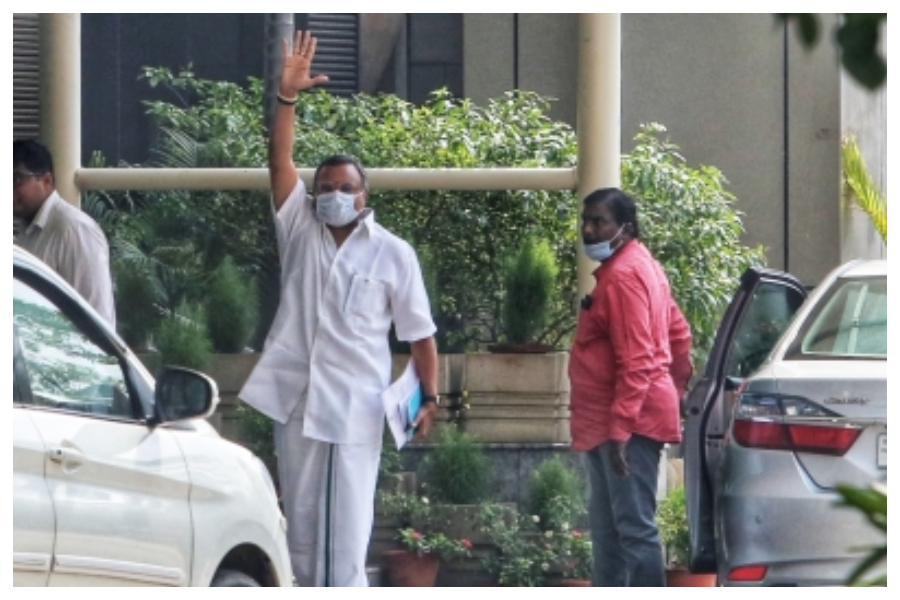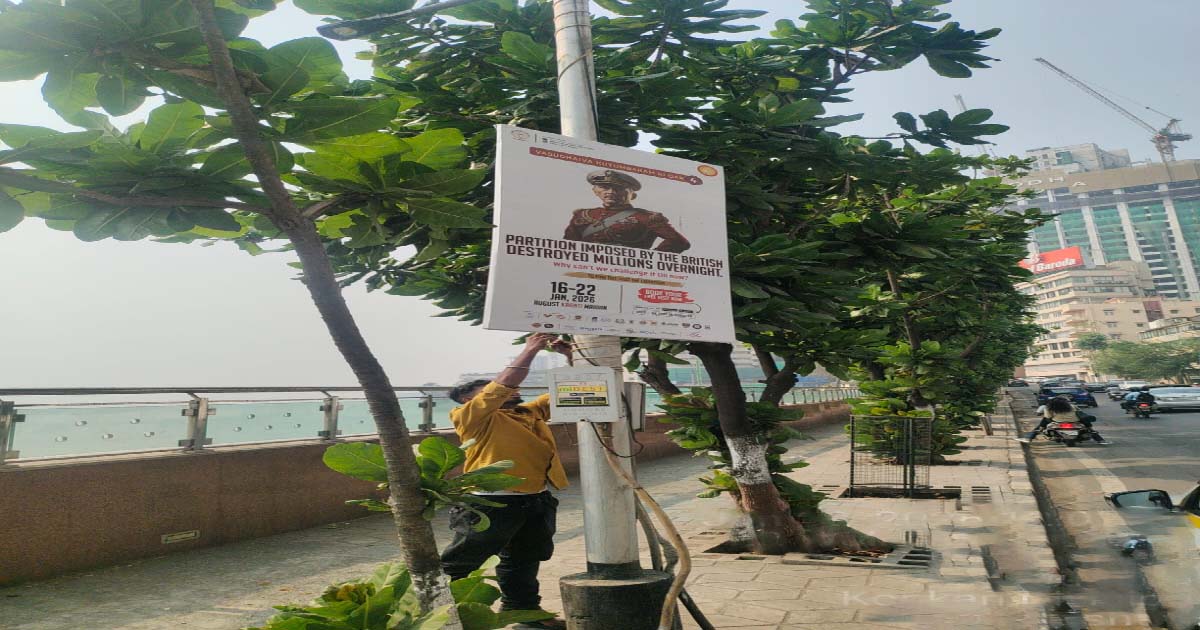Politics
Chinese Visa scam: CBI is playing test cricket with me, mocks Karti Chidambaram

Congress MP Karti P. Chidambaram on Saturday appeared before the Central Bureau of Investigation (CBI) for the third straight day to record his statements in connection with Chinese Visa Scam.
While interacting with the media, Karti Chidambaram said that he had written to Lok Sabha Speaker Om Birla against the CBI for seizing his confidential parliamentary papers and is awaiting his reply.
He also took a dig at the investigation agency by likening his interrogation to a test cricket game and termed it a “tactic” of harassment and political vendetta.
On Thursday, the CBI grilled Karti – son of former Finance Minister P. Chidambaram – for about six hours. The following day again, the questioning went on for about six hours.
S. Bhaskararaman his Chartered Accountant, is currently in custodial remand of the CBI. Karti will be confronted with him. The CBI had told the court that it wants to confront both the accused.
The CBI has also recovered 65,000 emails in the matter which will be used as evidence.
According to sources, a sales deed recovered during the raids is very important. This sales deed is of a property bought in Jor Bagh and the power of attorney is in the name of Bhaskararaman whereas the property was bought by Karti and his mother.
Karti Chidambaram will be questioned in this connection.
According to an FIR filed recently, a Mansa (Punjab) based private firm, Talwandi Sabo Power Limited, took help of a middleman and allegedly paid Rs 50 lakh to get the Visa issued for Chinese nationals to help completion of the project before the deadline.
“The Mansa (Punjab) based private firm was in the process of establishing a 1,980 MW thermal power plant and establishing of plant was outsourced to a Chinese company. The project was running behind its schedule. In order to avoid penal actions for the delay, the said private company was trying to bring more and more Chinese persons, professionals for their site at district Mansa (Punjab) and needed Project VISAs over and above the ceiling imposed by Ministry of Home Affairs,” said the CBI official.
The official said that for the purpose, the representative of the said private company approached a person based at Chennai through his close associate and thereafter they devised a back-door way to defeat the purpose of ceiling (maximum of Project VISAs permissible to the company’s plant) by granting permission to re-use 263 Project VISAs allotted to the said Chinese company’s officials.
In pursuance of the same, the said representative of Mansa based private company submitted a letter to Ministry of Home Affairs seeking approval to re-use the Project VISAs allotted to this company, which was approved within a month and permission was issued to the company.
“A bribe of Rs 50 lakh was allegedly demanded by said private person based at Chennai through his close associate which was paid by the said Mansa based private company. The payment of said bribe was routed from Mansa based private company to said private person of Chennai and his close associate through a Mumbai based company as payment of false invoice raised for Consultancy and out of pocket expenses for Chinese visas related works whereas the private company based at Mumbai was never in any kind of work relating to VISAs rather it was in an entirely different business of industrial knives,” said the CBI official.
It has been alleged that Karti’s father P. Chidambaram allegedly helped the Chinese getting visas by flouting rules.
The CBI officials said that they were looking into the matter.
Crime
‘Cash-for-query’ row: Lokpal gets 2 more months to decide on CBI sanction against Mahua Moitra

New Delhi, Jan 23: The Delhi High Court on Friday granted the Lokpal of India a final extension of two months to decide on granting sanction to the Central Bureau of Investigation (CBI) to file a charge sheet against Trinamool Congress (TMC) MP Mahua Moitra in connection with the alleged cash-for-query row.
A Bench of Justices Anil Kshetarpal and Harish Vaidyanathan Shankar allowed the application moved by the Lokpal seeking additional time, clarifying that no further extension would be granted to the anti-corruption body.
“The period of disposal is extended by two months, while observing that no further request for extension of time shall be entertained,” the Justice Kshetarpal-led Bench ordered.
Remarking that any further delay in deciding the issue would not be acceptable, it stressed that the Lokpal must strictly follow the stipulated timeline.
The present order came on a plea filed by the Lokpal after it failed to take a fresh decision within the earlier time frame fixed by the Delhi High Court.
In an order passed on December 19, 2025, the Justice Kshetarpal-led Bench set aside the Lokpal’s sanction allowing the CBI to file a charge sheet against Moitra, holding that the anti-corruption watchdog had misinterpreted provisions of the Lokpal and Lokayuktas Act, 2013.
Allowing Moitra’s plea against the sanction order, the Delhi High Court accepted her contention that the Lokpal had failed to properly consider the statutory requirement of examining the comments and material submitted by the public servant before granting sanction. It had directed the Lokpal to reconsider the issue afresh within one month.
However, as the Lokpal did not arrive at a decision within the prescribed period, the anti-corruption body approached the Delhi High Court seeking an extension of time.
The case arose from allegations levelled by Bharatiya Janata Party (BJP) MP Nishikant Dubey, who accused Moitra of accepting cash and luxury gifts from Dubai-based businessman Darshan Hiranandani in exchange for raising questions in the Parliament.
Maharashtra
Mumbai: BMC takes strict action against those who put up banners without permission, cases registered at Malabar Hill and DB Marg police stations

Mumbai: The Mumbai Municipal Corporation administration has provided space for displaying temporary advertisements within the municipal limits, some institutions, organizations and traders are illegally putting up banners on electricity poles on both sides of the roads. A case has been registered against such institutions, organizations and traders by the Licensing Department at Gaudevi, Malabar Hill, Dr. DB Marg police stations against an unknown person. This action was taken on two days i.e. on 21st and 22nd January 2026. A total of 41 banners were removed in this action. The Licensing Department of the Municipal Corporation has also appealed to the public to display advertisements only after taking permission from the Municipal Corporation. The Municipal Corporation has also made it clear that strict action will continue against those who put up banners, hoardings and posters in public places without permission.
This action has been taken by the Licensing Department under the guidance of Mrs. Chanda Jadhav, Deputy Commissioner (Special) of the Mumbai Municipal Corporation. The Licensing Department conducted the operation at Dr. Gopal Rao Deshmukh Marg (Peder Road), Pandita Ramabai Marg, Bholabhai Desai Marg, Walkeshwar, Malabar Hill, Dr. Dadasaheb Bhadkamkar Marg, Maulana Shaukat Ali Marg, Sardar Vallabhbhai Patel Marg and Raja Ram Mohan Roy Marg of the Municipal Corporation. In addition, First Information Reports (FIRs) regarding the registration of the offence have been registered at three police stations namely Gawadevi, Malabar Hill and Dr. Dadasaheb Bhadkamkar Marg. Accordingly, a case has been registered at the concerned police station. As per the directions of the High Court, it is prohibited to put up any hoarding, banner or poster in public places within the limits of the Municipal Corporation without a permit. It is prohibited to put up any advertisement hoarding, banner or poster on any subject on public roads and footpaths under the jurisdiction of the Mumbai Municipal Corporation without the prior permission of the Municipal Corporation. Sections 328/328-A, 471 of the Maharashtra Prevention of Defacement of Property Act 1995 and 18 of the Mumbai Municipal Corporation Act provide for legal action against any person or organisation who puts up such hoardings, banners or posters without permission. The Licensing Department has stated that if these provisions are violated, legal action will include registering a case against the person concerned and filing a case in court.
Complaint facility on toll-free number
The Mumbai Municipal Corporation administration has appealed to citizens to contact the toll-free number 1916 to register a complaint against unlicensed and unauthorized hoardings and banners. The facility to register a complaint against unlicensed hoardings is also available on the municipal corporation’s official website www.mcgm.gov.in and on social media @mybmc.
National News
Mumbai, Parts Of Thane & Bhiwandi To Face 10% Water Cut As BMC Undertakes Maintenance Work; Know If Your Area Is Affected

Mumbai: Parts of Mumbai will face a 10 percent water cut from January 27 to February 7, 2026, the Brihanmumbai Municipal Corporation announced on Friday, January 23. The civic body said the reduction in supply is due to annual maintenance work on the pneumatic gate system at Pise in neighbouring Thane district. According to PTI, the maintenance is necessary to ensure the smooth functioning of the water distribution system.
The maintenance work is expected to disrupt water supply across a large part of the Mumbai Metropolitan Region, affecting most civic wards in the island city and eastern suburbs, officials said. Additionally, several areas under the Thane and Bhiwandi municipal corporations that receive their water supply from the BMC are also likely to face interruptions.
Furthermore, the civic body has urged residents in the affected areas to use water judiciously and avoid wastage during the maintenance period.
The BMC has also announced a scheduled water pipeline relocation and repair work in Bhandup West and Mulund West on January 27, 2026. The work is expected to take 24 hours, during which water supply to Bhandup, Mulund and parts of Thane city will remain suspended.
The BMC’s Hydraulic Engineering Department has scheduled the relocation and maintenance work to reconfigure key water infrastructure in the eastern suburbs. Under the project, 12 existing water connections linked to the 2,400 mm Vaitarna main pipeline at Mulund West will be shifted and integrated with the larger 2,750 mm Upper Vaitarna main pipeline. In addition, the civic body will carry out protective measures, including the installation of iron covers on sections of the 2,400 mm Vaitarna pipeline in the Khindipada area of Bhandup West, to strengthen the system and ensure operational safety.
-

 Crime3 years ago
Crime3 years agoClass 10 student jumps to death in Jaipur
-

 Maharashtra1 year ago
Maharashtra1 year agoMumbai Local Train Update: Central Railway’s New Timetable Comes Into Effect; Check Full List Of Revised Timings & Stations
-

 Maharashtra1 year ago
Maharashtra1 year agoMumbai To Go Toll-Free Tonight! Maharashtra Govt Announces Complete Toll Waiver For Light Motor Vehicles At All 5 Entry Points Of City
-

 Maharashtra1 year ago
Maharashtra1 year agoFalse photo of Imtiaz Jaleel’s rally, exposing the fooling conspiracy
-

 National News1 year ago
National News1 year agoMinistry of Railways rolls out Special Drive 4.0 with focus on digitisation, cleanliness, inclusiveness and grievance redressal
-

 Maharashtra1 year ago
Maharashtra1 year agoMaharashtra Elections 2024: Mumbai Metro & BEST Services Extended Till Midnight On Voting Day
-

 National News1 year ago
National News1 year agoJ&K: 4 Jawans Killed, 28 Injured After Bus Carrying BSF Personnel For Poll Duty Falls Into Gorge In Budgam; Terrifying Visuals Surface
-

 Crime1 year ago
Crime1 year agoBaba Siddique Murder: Mumbai Police Unable To Get Lawrence Bishnoi Custody Due To Home Ministry Order, Says Report






















